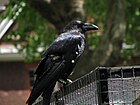Kozak or Kozák is a Slavic surname literally meaning "Cossack". Notable people with the surname or name include:
Mraz or Mráz is a surname of Czech, Slovak, and Croatian origin. It means "frost" and is cognate to Maroz (Belarusian), Mróz (Polish), and Moroz. It may refer to:
Kaminski or Kamiński is a surname of Polish origin. It is the sixth most common surname in Poland.
Baranov (masculine) or Baranova (feminine) is a common Russian surname. It is derived from the sobriquet "баран". Notable people with the surname include:
Krol is a surname of several possible origins.
Kovalchuk, Kavalchuk, Kowalczuk (Polish), Covalciuc (Moldovan/Romanian), also transliterated as Kowalchuk, is a common East Slavic surname. The Kovalchuk name extends back to before 1500 AD in Kievan Rus.
Kovalyov, often written as Kovalev, or its feminine variant Kovalyova, Kovaleva (Ковалёва), is a common Russian surname, an equivalent of the English surname Smithson. Due to the ambiguous status of the Cyrillic letter yo, the surname may be written with the Cyrillic letter ye instead, though literate Russian speakers always pronounce it yo.
van Heerden is a common Afrikaans surname. Although most van Heerdens are South African nationals, a number are also resident in Australia, Namibia, the Netherlands and the United Kingdom.
Avdeyev or Avdeyeva is a common Russian last name that is derived from the male given name Avdey and literally means Avdey's.
Kravtsov is a Russian language surname, of Western Slavic origin "krawc" coming from Polish form for krawiec/kravets, "tailor". The official transcription for time of Russian Empire and during Russian Civil War was Krawtzoff.
Levchenko is a surname of Ukrainian origin. It derives from the personal name Levko. The surname, Levchenko, was created by adding the Ukrainian patronimic suffix, -enko, meaning someone of Levko, usually the son of Levko.
Petrov or Petroff or Petrova, is one of the most common surnames in Russia and Bulgaria. The surname is derived from the first name Pyotr or Petar and literally means Pyotr's or Petar's.
Gajewski is a Polish surname. It is related to the following surnames:
Prokopenko or Prakapienka is a Ukrainian, Belarusian, and Russian surname. It may refer to:
Kovalevich is a Slavic surname used in Russian and Ukrainian, Belarusian, and Polish cultures.
Klymenko is a Ukrainian surname that derived from the given name of Klym, which originated from the Latin Clement. Sometimes it is transliterated through Russian language as Klimenko and Belarusian as Klimenka.
Lammert is a given name derived from Lambert and a surname. Notable people with the surname include:

Pieter "Piet" van der Kruk was a Dutch heavyweight weightlifter and shot putter. He won five national weightlifting titles and four shot put titles, and held the national shot put record from 1967 to 1976. He qualified for the 1968 Summer Olympics both as a shot putter and weightlifter; he chose to compete in weightlifting only and finished in ninth place.
Bloem is a Dutch name, meaning "flower" as well as "flour". As a feminine given name, also rendered Bloeme, it signifies flower, youth, and beauty. The surname can have a variety of origins; besides a matronymic, the surname can have originated as descriptive or metonymic occupational. The variants Bloeme and Bloemen are thought to be primarily matronymic. People with the name include:
This page is based on this
Wikipedia article Text is available under the
CC BY-SA 4.0 license; additional terms may apply.
Images, videos and audio are available under their respective licenses.

